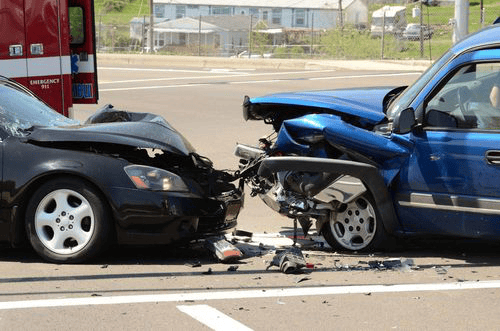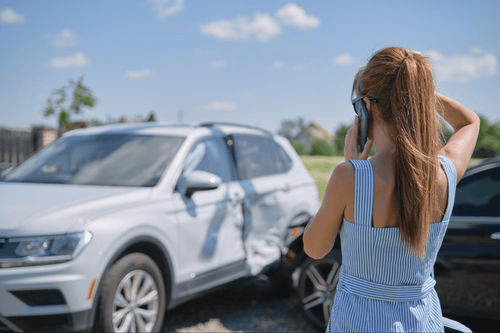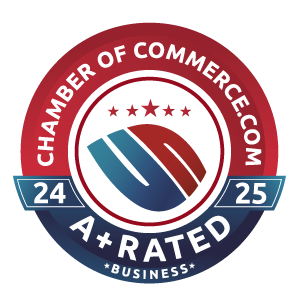Table of Contents
Navigating Title Loans: the Basics and Risks
If you are trying to apply for a title loan, you might be thinking about the worst-case scenario and asking yourself, “What happens if my car is totaled and I have a title loan?”
Before you can dive into car accidents and title loans, it’s important to understand how title loans work. Title loans are a type of secured loan, and you can borrow cash by using your vehicle title as collateral for funding. With a title loan, your eligibility is primarily based on the value of your car and your income. To get approved for a car title loan, you will need to meet the basic requirements, which typically include having a title to a qualifying car in your name, being of legal age, and providing a few documents to verify your income and other important information.1
Since title loans are secured by collateral, the application process can be quite flexible. With that flexibility comes both benefits and risks, such as:1
- Bad Credit is Not an Issue: Whether you are applying for a ChoiceCash title loan from Kentucky, Texas, Virginia, or another applicable state, you can access a convenient and streamlined application process, even if you have bad credit!1
- Interest Rates are More Competitive: When a loan or a line of credit (LOC) is secured by an asset, the interest rates are often more competitive than the rates of unsecured loans and LOCs. In the case of a loan secured by a qualifying vehicle title, an eligible borrower can expect to access these competitive rates!1
- Defaulting on Your Title Loan can Result in Repossession: One of the potential risks associated with an auto title loan is the risk of repossession if you cannot properly manage your payments. It is important to make sure that your title loan payments are a top priority in your budget, along with other essential items.
- Totaling Your Vehicle Does Not Absolve You From Your Debt Obligation: Whether you have a title loan or an auto loan that financed your vehicle purchase, if you total your vehicle, you are still on the hook for the remaining balance of your loan.
Understanding What Happens if My Car Is Totaled and I Have a Title Loan

Unfortunately, car accidents are always a risk that you need to consider as a driver. You may be a safe and responsible driver, but according to the National Highway Traffic and Safety Administration, other distracted and careless drivers can cause crashes daily. For most drivers in America, their vehicles are their main source of transportation, and they may not have the means to replace it after a serious accident.
If you get into an accident and your insurance company considers your car to be a total loss, that means the vehicle is essentially no longer worth fixing because the cost of the repairs exceeds your car’s current market value. Although the exact threshold can vary from state to state, this occurs when the cost of repairing the damage is greater than 75%-80% of the car’s market value.
The Department of Motor Vehicles (or state equivalent) will issue a salvage title if your car is in this condition, which significantly reduces its value and makes it difficult to insure or sell in the future. A formal inspection of your vehicle must be completed by the insurer before your vehicle can be written off as a total loss and issued a salvage title.
If you total your vehicle with a title loan on it, you should report the accident to your insurance company and your lienholder. Additionally, both your insurance company and the insurance company of the other party involved should be informed that you have a lienholder. It is recommended to provide these companies with your lienholder’s contact information, as it will likely be necessary in the future to navigate this situation.
How Insurance Coverage Plays a Role With Totaled Cars and Title Loans
Totaling your car can be devastating financially, especially if you have a lien on your vehicle title from a title lender. The type of insurance coverage that you and the other party have at the time of the accident can play a significant role in the outcome of this situation, as seen below:
- No-Fault Scenario: Let’s say that your car is totaled and the other driver is found to be at fault for the accident. Depending on their coverage, their insurance company may be obligated to pay your lienholder the actual cash value (ACV) of your vehicle, which means its market value before it was totaled, minus depreciation.
- Fault Scenario with Liability Coverage: If you were found to be at fault for an accident and you have liability coverage, you will not receive any compensation for your totaled vehicle, but your insurer will cover the cost of repairing the other vehicle involved in the accident.
- Any Fault Scenario with Collision Coverage: Regardless of who is responsible for the accident, when you have collision coverage, your insurer will compensate your lienholder for the actual cash value of your vehicle, minus your deductible and the depreciation of the car. If the other driver is at fault and has either liability coverage or collision coverage, you will not be responsible for paying the deductible.
Keep in mind that your insurance company will not usually handle the repairs of your vehicle directly. As mentioned above, what typically happens is that your insurance company (or the other party’s insurer) will send your lienholder an amount equal to the ACV of your vehicle before it was totaled. This amount includes the depreciation of your vehicle’s value since the accident and may not be enough to cover the remaining balance of your title loan.
What Happens if I Still Have a Balance on My Title Loan and My Car Is a Total Loss?

Even if your car is totaled or has been in an accident and needs a significant amount of repairs, you are still responsible for paying off your title loan. As mentioned previously, if there is an insurance payout, it will typically go to the lienholder first. If the payout does not cover the total balance, then you must continue to make regular scheduled payments on the remaining loan balance unless the account is modified or settled.
If the insurance payout does not cover the total amount that you owe, the lender may have the right to demand full payment of the entire balance at once. However, not all lenders will ask the borrower to pay the lump sum immediately. If you find yourself in this situation, you will need to fully review your loan agreement and pay close attention to the sections that apply to vehicle accidents or loan default during the repayment period. If you have any questions about the specifics of your loan agreement, it is recommended that you contact your lender or loan servicer directly.
One of the ways you can protect yourself as a driver is to have gap insurance, which is an optional type of coverage to help cover the difference between the insurance payout amount and the rest that you owe on your loan in the event that your vehicle is totaled.







